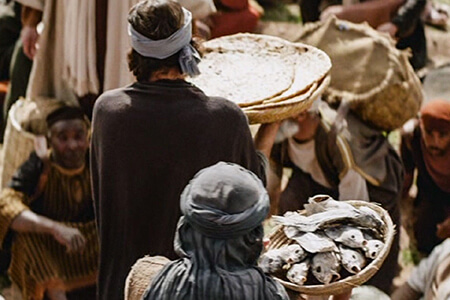 Isaiah 55:1-3
Isaiah 55:1-3
 Romans 8:35, 37-39
Romans 8:35, 37-39
 Matthew 14:13-21
Matthew 14:13-21
As the world goes through a rough year of uncertainties, helplessness, conflicts and tragedies, how encouraging and comforting it is to hear from St. Paul in the second reading that no hardship, persecution or sword will separate us from the love of Christ (Ref. Rm 8:35). Whatever the circumstances, we shall overcome, "We are more than conquerors through him who loved us" (Rm 8:35).
Indeed, St. Paul's statement of faith, Isaiah's prophecy "come to me … listen, so that you may live" (Is 55:3) and the Psalmist's beautiful verse of gratitude "You open your hand to feed us, Lord, and satisfy our needs" set the scene for one of Jesus' greatest miracles – the famous miracle of the five loaves and two fish (Ps 145) .
In the Gospel reading, we hear that Jesus has been healing the sick. It has become late. The place is deserted so the disciples ask Jesus to send the crowds to the villages to buy food for themselves. But Jesus said "[Y]ou give them something to eat" (Mt 14:16). To the disciples, that seems a formidable if not impossible task for "there were about five thousand men" (Lk 9:14) and "[t]wo hundred silver coins would not buy enough bread for each of them to have a piece" (Jn 6:7).
Pope Francis spoke about this miracle on the Solemnity of the Most Holy Body and Blood of Christ in the Church of Santa Maria Consolatrice on 23 June 2019. By requesting his disciples to give the crowds something to eat, Jesus is telling us, whatever we have, no matter how little it is, can bear fruit if we share, if we give it away as the boy, who has five loaves and two fish, has done (Ref. Jn 6:9). The Holy Father said that "The Lord does great things with our littleness, as he did with the five loaves". God's omnipotence is all about love and love can accomplish great things with little. Our little has great value in the eyes of Jesus if we do not keep it to ourselves.
The miracle happens when Jesus "raised his eyes to heaven, pronounced the blessing, broke the loaves, and handed them to the disciples to distribute to the people" (Mt 14:19). The first actions that Jesus does are to pray and to bless; praying for God's providence and blessing for turning the five loaves and two fish into enough food for the crowds. Jesus shows us what the blessing means by freely distributing the loaves. The Holy Father reminded us that blessing is not about saying nice words but about speaking goodness with love. When God blesses us during Mass, we receive the encouragement to go on. When we praise God together in church, we are in turn blessing Him and it is the joy of praise that heals our hearts.
The emphasis of the gospel account is not on the multiplication of the bread but on the act of sharing (Jesus breaking the loaves, and handing them to the disciples to distribute to the people) and trusting in God the Father and his providence. "Surprisingly, the account of the multiplication of the loaves does not mention the multiplication itself"; "He does not change the five loaves into five thousand" but "those fives loaves never run out", the Holy Father said.
Having received the blessing at the end of the Mass, if we in turn bless others, we are doing something for them, speaking a goodness with love, turning a word into a gift, then the goodness will never run out.
